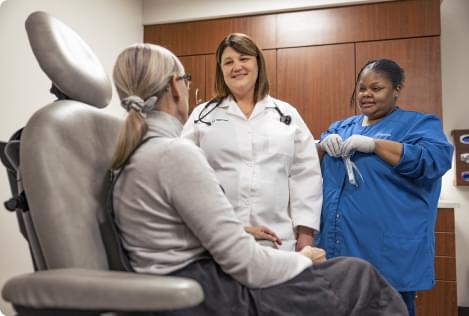| Study Name | Description | Trial Category Sort descending | Trial SubCategory |
|---|---|---|---|
| S1703 | This study is looking at overall survival or patients monitored with serum tumor markers veruss usual care. You must be diagnosed with metastatic hormone receptor positive breast cancer. | Cancer | Metastatic Breast |
| A022104 | The purpose of this study is to look at the effectiveness of two chemo regimens mFOLFOX6 or CAPOX vs mFOLFIRINOX in getting patients to remission. You must be diagnosed with stage 2 or 3 rectal cancer. | Cancer | Rectal |
| EAY191-N4 | The purpose of this study is to compare Selumetinib and Olaparib vs Selumetinib alone. You must be diagnosed with recurrent or persisent Ovarian or Endometiral cancer. Your cancer must have a RAS pathway mutation. | Cancer | Ovarian & Endometrial |
| URCC 18007 | A study see if Bupropion is effective for reducing cancer-related fatigue. You must have completed surgery, radiation and/or IV chemo at least 2 months prior to enrollment. | Cancer | All tumor types |
| A031803 | The purpose of this study is to determine the effectiveness of intravesical gemcitabine in combination with prembrolizumab. Patients must have been diagnosed with invasive bladder and already received chemo. | Cancer | Bladder |
| A031701 | The purpose of this study is to compare standard or dose dense gemcitabine and cisplatin chemo. You must have been diagnosed with muscle invasive bladder cancer. | Cancer | Bladder |
| EAY191-S3 ComboMATCH | The purpose of this study is to determine the effectiveness of Paclitaxel and Ipatasertib in patients who progressed within 6 months of taxane-based therapy. You must have a a AKT-Altered cancer. You must have a locally advanced, unresectable or metastatic cancer. | Cancer | Solid Tumors (non-breast) |
| S2209 | This study is for frail-intermediately fit newly diagnosed multiple myeloma patients. Your current lab values will be used to determine if you qualify for this study. This study compares different chemo regimens to determine the effectiveness of them. | Cancer | Multiple Myeloma |
| NRG-GI005 | The purpose of this study is to look at the tumor DNA with blood draws to determine risk of cancer recurrance. You must be diagnosed with Stage 2A colon cancer. | Cancer | Colon |
| A031702 | The purpose of this study is to look at the effectineness of cabozantinib combined with nivolumab and ipilimubmab. You must be diagnosed with a rare genitourinary tumor of the kidney, bladder, ureters or penis. | Cancer | Rare Genitourinary |
| ISPY 2 | This study uses the type of breast cancer you are diagnosed with to determine what treatment you are given. You must be diagnosed with stage 2 or stage 3 breast cancer. This study requires regular MRI's. | Cancer | Breast |
| GU012 | The purpose of this study is to compare standard immunotherapy with immunotherapy and radiation. You must be diagnosed with metastatic renal cell cancer and have not had surgery for this cancer. | Cancer | Metastatic Renal Cell |
| Bayer ON-TRK | The purpose of this study is to learn about the effectiveness of Vitrakvi in patients with TRK Fusion cancer. You must have a advanced solid tumor with a NTRK gene fusion. | Cancer | All tumor types |
| A031704 | The purpose of this study is to compare overall survival in patients treated with ipilimumab-nivolumab followed by either nivolumab or cabozantinib-nivolumab. You must be diagnosed with metastatic renal cell cancer. | Cancer | Metastatic Renal Cell |
| NRG-GI008 | The purpose of this study to use blood draws looking at the tumor DNA in the blood to determine need for chemotherapy. You must be diagnosed with stage 3 colon cancer. | Cancer | Colon |
| NRG-BR009 | The purpose of this study is treat breast cancer after surgery. You must have estrogen positive breast cancer and an oncotype score ≤25. This study looks at adding chemotherapy to the standard treatment of ovarian function suppression and aromatase inhibitor. | Cancer | Breast |
| NRG-GI004 | The purpose of this study is to look at the effectiveness of Atezolizumab alone or in combination with other chemo regimens. You must be diagnosed with metastatic colorectal cancer with a DNA mismatch repair deficiency and BRAF gene mutation. | Cancer | Metastatic Colorectal |
| NRG-HN005 | The purpose of this study is to determine if a reduced dose of radiation therapy is as effective as the standard dose of radiation. You must be diagnosed with P16-Positive Oropharyngeal cancer. Your smoking history must be <10 pack-years. | Cancer | Oropharyngeal |
| A031902 | The purpose of this study is to evaluate progression free survival and overall survival with the use of enzalutamide and rucaparib vs enzalutamide alone. You must be diagnosed with metastatic castration-resistant prostate cancer. This must be your first treatment for your metastatic cancer. | Cancer | Metastatic Prostate |
| NRG-GU009 | The purpose of this study is to determine if it is effective to use your genomic risk to determine the level of treatment you need. Those with a lower genomic risk get a de-intensified treatment and those with a higher risk get a intensified treatment. You must be diagnosed with high-risk prostate cancer. | Cancer | Prostate |
| EA3161 | This study is comparing maintenance Nivolumab vs observation in patients with locally advance, intermediate risk HPV Positive oropharynx cancer. | Cancer | Oropharyngeal |
| A081801 (sub study A151216) | The purpose of this study is to compare disease free survival when adding immunotherapy to initial chemotherapy vs immunotherapy only in maintenance therapy. You must be diagnosed with stage 2 or stage 3 non-small cell lung cancer (NSCLC). | Cancer | Non-Small Cell Lung |
| NRG-GU010 | The purpose of this study is to determine if it is effective to use your genomic risk to determine the level of treatment you need. Those with a lower genomic risk get a de-intensified treatment and those with a higher risk get a intensified treatment. You must be diagnosed with unfavorable intermediate risk prostate cancer. | Cancer | Prostate |
| S2013 | The purpose of this study is the look at the side effects of immunotherapy treatment. You must be starting immunotherapy alone not in combination with other treatments. You must have a solid tumor. | Cancer | Solid Tumors |
| NRG-LU002 | The purpose of this study is to compare the effectiveness of chemo alone vs SBRT (stereotactic body radiation therapy) and chemo. You must be diagnosed with metastatic non-small cell lung cancer (NSCLC). You must have already received first line therapy. | Cancer | Metastatic Non-Small Cell Lung |
| A082002 | The purpose of this study is to determine in SBRT (stereotactic body radiation therapy) improves survival in advanced stage NSCLC. You must be diagnosed with stage 3 or 4 Non-Small Cell Lung Cancer (NSCLC). | Cancer | Non-Small Cell Lung |
| NRG-LU008 | The purpose of this study is to compare chemo and radiation followed by immunotherapy vs SBRT (stereotactic body radiation therapy) to primary tumor follwed by chemo and radiation then immunotherapy. You must be diagnosed with Stage 2 or 3 non-small cell lung cancer (NSCLC). | Cancer | Non-Small Cell Lung |
| EAY191-E5 | This study is for patients who have a KRAS G12C mutation and advanced/metastatic solid tumors. Your cancer must have progressed on standard of care therapy. You cannot have colorectal cancer or non-small cell lung cancer. | Cancer | Solid Tumors |
| LUNGMAP | This is a screening study to eavluate biomarker-driven therapies and immunotherapies in previously treated Non-Small Cell Lung Cancer (NSCLC). You must be diagnosed with Stage 4 or recurrent NSCLC. Tissue is sent for screening and patient can be assigned to a sub study based on mutations found. | Cancer | Metastatic Non-Small Cell Lung |
| NRG-LU007 | This study is comparing effectiveness of atezolizumab alone vs atezolizumab and radiation. You must be diagnosed with extensive stage small cell lung cancer. | Cancer | Small Cell Lung |
Unsupported Browser! This website will offer limited functionality in this browser. We only support the recent versions of major browsers like Chrome, Firefox, Safari, and Edge.


